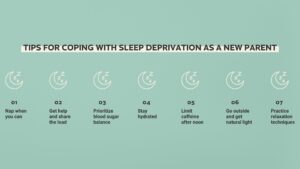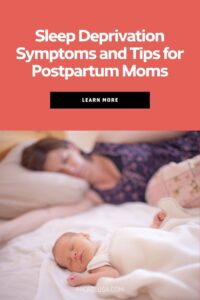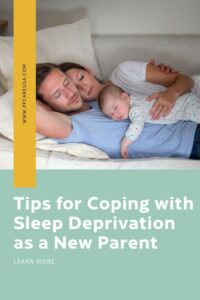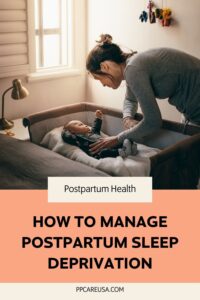Why You’re Still So Tired After Having a Baby (Even When the Baby Sleeps)
Sleep deprivation in the postpartum period isn’t just about feeling tired—it’s a hormonal rollercoaster that affects your entire body. From the moment your baby is born, your sleep schedule is flipped upside down.
Whether you’re waking every two hours to feed, lying awake with anxiety, or struggling to fall asleep even when your baby is resting, the exhaustion is real—and it’s more than just lack of rest.
In this post, we’ll explore how sleep deprivation affects new moms on a physical and hormonal level, what’s normal (and what’s not), and how to support your recovery so you can start feeling like yourself again. We’ll answer questions like:
- How long does sleep deprivation last for new parents?
- How does lack of sleep affect new mothers?
- How much sleep does a new mom really need?
- Can postpartum hormones cause insomnia?
- And how is sleep deprivation linked to postpartum depression, anxiety, rage, and fatigue?
Let’s talk about what’s really going on behind that bone-deep exhaustion—and how to get support that actually helps.
How Much Sleep Does a New Mom Need?
The average adult needs 7-9 hours of uninterrupted sleep per night. But for new parents, especially breastfeeding moms, getting that much sleep all at once is nearly impossible. Studies show new moms often get just 5-6 hours of fragmented sleep in the first few months postpartum.
This kind of sleep debt builds up quickly. It affects cognitive function, emotional regulation, and hormone balance—all of which are already shifting after childbirth.
So that sluggish feeling you get every afternoon at 2pm? Yeah, it’s not just in your head—it’s the cumulative effect of broken sleep, hormonal chaos, and your body begging for recovery. You’re not lazy or unmotivated—you’re running on empty, and it’s time to give yourself grace and support.
How Long Does Sleep Deprivation Last for New Parents?
The early months are often the hardest, but sleep deprivation can continue well beyond the newborn stage. Research shows that sleep disruptions can persist until a child is 6 years old, but the most intense period is typically the first 6-12 months.
The severity and duration of sleep deprivation depends on many factors, including feeding choices, your baby’s sleep patterns, and the amount of support you have at home.
Sleep Deprivation Symptoms in Postpartum Moms
Not sure if what you’re feeling is normal? Here are common signs of postpartum sleep deprivation:
- Feeling constantly exhausted, even after sleeping
- Brain fog or memory lapses
- Trouble concentrating
- Mood swings or irritability
- Increased anxiety or emotional sensitivity
- Headaches
- Low immunity or frequent illness
- Insomnia (yes, sleep deprivation can cause trouble sleeping!)
If you’re experiencing several of these symptoms daily, it may be time to take a closer look at your hormonal and sleep health.
Can Postpartum Hormones Cause Insomnia?
Absolutely. After birth, your estrogen and progesterone levels drop sharply. Progesterone, known as the “relaxing hormone,” helps promote deep sleep. When it’s low, insomnia and light, disrupted sleep are common.
Add high cortisol (the stress hormone), night wakings, and anxious thoughts, and it’s no wonder so many new moms struggle with postpartum sleep issues.
Sleep Deprivation and Postpartum Mental Health
There’s a strong connection between poor sleep and postpartum mood disorders. Sleep deprivation has been linked to:
- Postpartum depression
- Postpartum anxiety
- Postpartum rage
- In severe cases, postpartum psychosis
Lack of sleep alters brain chemistry, disrupts hormone production, and increases inflammation—all of which contribute to mood instability.
If you’re waking up angry, anxious, or emotionally flat, don’t brush it off as “just being tired.” These could be signs that your mental health needs support.
Why Am I So Tired Postpartum? It’s Not Just Sleep
While broken sleep plays a big role, postpartum fatigue can also be caused by:
- Hormonal changes (low progesterone, thyroid imbalance)
- Nutrient deficiencies (iron, magnesium, vitamin D)
- Blood loss during delivery
- Dehydration
- Emotional stress or anxiety
If you’re wondering, “Why do I feel so tired postpartum even when I sleep?” it’s worth exploring these root causes with lab testing and professional support.
Tips for Coping with Sleep Deprivation as a New Parent
You may not be able to get 8 uninterrupted hours of sleep right now, but there are still ways to support your rest and hormone health:
- Nap when you can – Even 30 minutes can make a difference.
- Share the load – Alternate night feedings or get help from a partner, family member, or postpartum doula.
- Prioritize blood sugar balance – Eat protein, healthy fats, and complex carbs at every meal to avoid crashes.
- Stay hydrated – Dehydration adds to fatigue.
- Limit caffeine after noon – It can disrupt your ability to fall asleep later.
- Get outside – Natural light helps regulate your circadian rhythm.
- Practice relaxation techniques – Deep breathing, yoga, or a short walk can reduce stress and support sleep.

When to Get Help for Postpartum Sleep Issues
If your sleep deprivation is affecting your ability to function, care for your baby, or enjoy daily life, it’s time to get help. You don’t have to white-knuckle your way through.
Book a call with Postpartum Care USA to talk about:
- Postpartum hormone and nutrient testing
- Natural sleep support (like magnesium or adaptogens)
- Therapy or counseling for postpartum anxiety or depression
- Safe medications if necessary
You Deserve Rest and Recovery
Sleep deprivation may be common in new parenthood, but it doesn’t have to be your new normal. Prioritizing rest, hormonal health, and emotional well-being isn’t just self-care—it’s survival.
If you’re ready to get to the root of your postpartum fatigue, anxiety, or sleep issues, we’re here to help. Book a consultation with Postpartum Care USA and get the personalized support you need to heal—from the inside out.
Pin This for Later:



Postnatal Depletion
Meet the Team
Our Services
Supplements
A virtual healthcare clinic that helps postpartum mamas recover from postnatal depletion syndrome with a holistic approach.


Get in touch